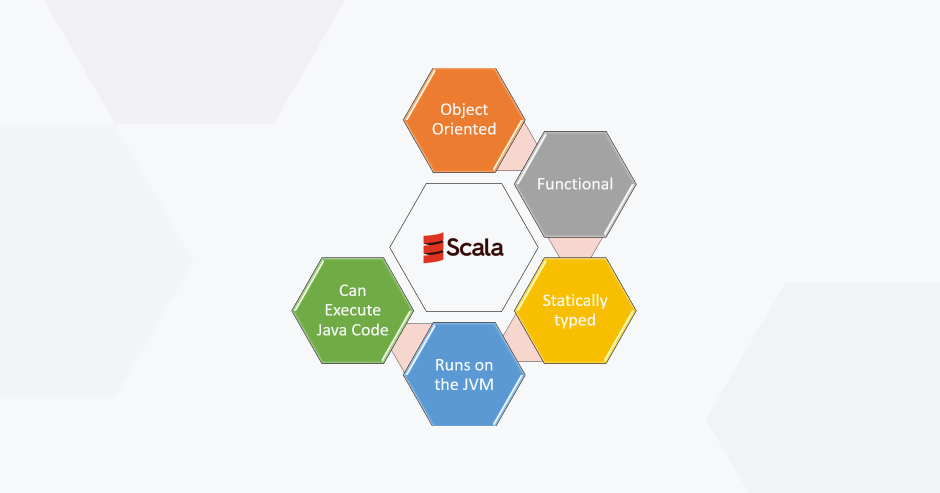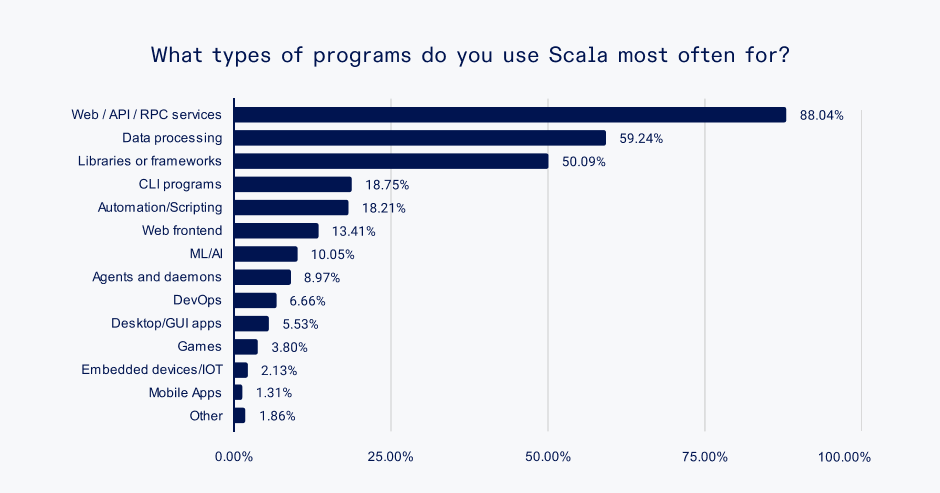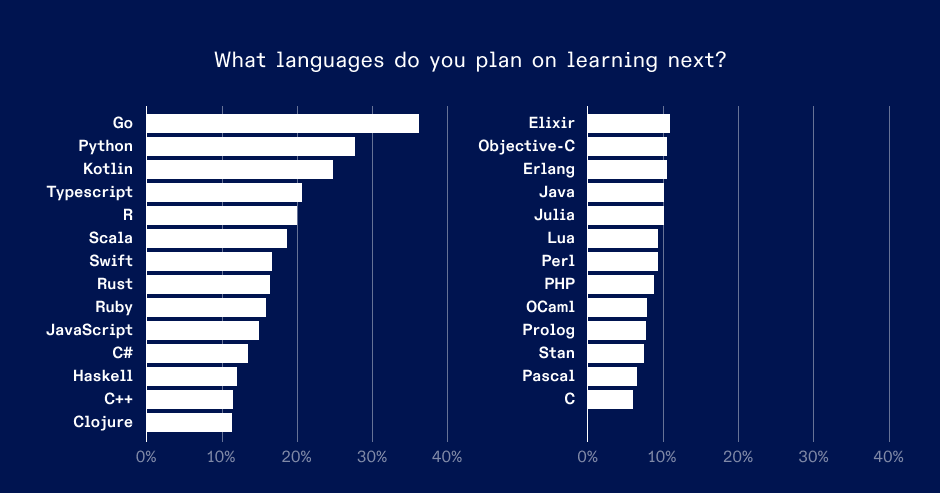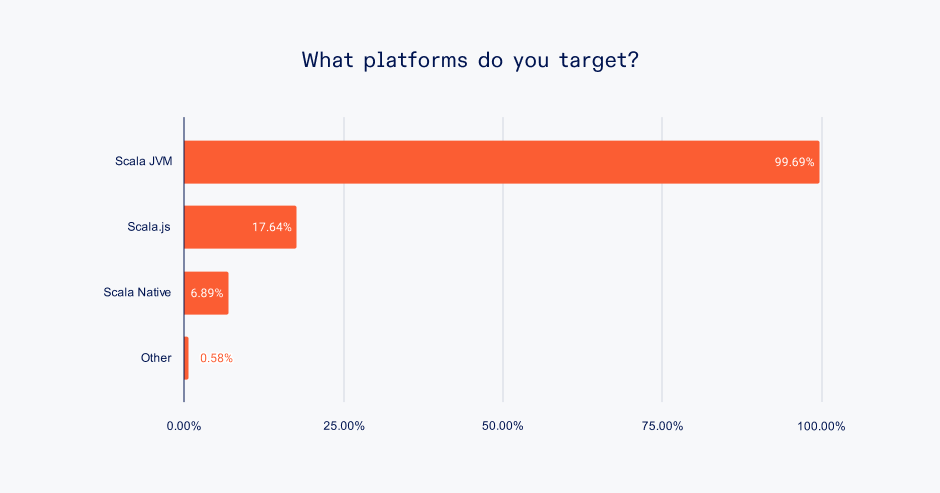“Startups are strategically opting for Scala because that's where the best developers are now. It's not just a trend – Scala developers are consistently commanding impressive salaries, often surpassing $110K.” – Eugene Garla, VP of Talent at Index.dev.

Backing this up is a recent HackerRank report, which places Scala as the 14th most sought-after programming language worldwide. This conclusion stems from analyzing a vast pool of 1.5 million developers and assessing over 15,000 job listings.
ZDNet validates Scala's prominence, naming it among the popular programming languages with high interview potential. Designed to encapsulate general programming concepts concisely and with a strong emphasis on type safety, Scala stands out.
As a versatile, high-level, statically-typed programming language, Scala seamlessly fuses object-oriented and functional programming paradigms. Its creation aims to encapsulate universal programming patterns in a streamlined and safe manner.
Embracing Scala’s niche status and acknowledging the rarity of Scala developers, we understand the challenges of talent acquisition. Whether you're an adept tech recruiter or an enthusiastic startup founder, this guide holds the keys to successful Scala developer hiring.
Sourcing techniques, candidate evaluation, and global salary insights - everything you need is here. Let’s get started!
Looking for high-performing Scala developers? Contact Index.dev and we’ll find the matching candidates within 48 hours →

Scala's project advantages
In recent years, Scala's ascendancy has been undeniable. Renowned platforms like Twitter have embraced this language, spurring a demand for adept Scala programmers. But what prompts businesses to shift from their Java and Ruby comfort zones, opting instead to engage Scala developers for their ventures?
- Seamless scalability: True to its name, Scala effortlessly supports scalability. This makes it ideal for expansive development teams and intricate code bases. Developers can craft code that seamlessly adjusts.
- Amplified efficiency: So, what's Scala's forte? It excels at enhancing productivity. Take Twitter as an example - adopting Scala facilitated handling massive tweet volumes concurrently, showcasing its operational scalability.
- Functional & object-oriented fusion: Scala combines features of both functional and object-oriented languages. This fusion proves particularly empowering for developers proficient in Java and other object-oriented counterparts.
- Integration with Java: Scala graciously coexists with Java, enabling developers to leverage their existing Java libraries and tools. This interoperability streamlines transitions.
- Concurrent proficiency: Scala boasts advanced multithreading and concurrent processing capabilities. This prowess makes it a front-runner for crafting systems necessitating parallel task execution, such as Big Data applications.
Challenges in finding Scala developers
The assertion that "Scala is a tough nut to crack" holds a certain truth. Scala's complexity isn't to be underestimated. Achieving mastery demands a deep immersion in the language itself. While Scala is a catalyst for boosting productivity and scalability, its intricate nature can prove daunting. Particularly so for newcomers or those with limited exposure.
Its landscape is adorned with sophisticated elements like tuples and macros, adding to its intricacy. Manipulating these features proficiently, without disrupting the existing codebase, is a realm mastered by seasoned engineers alone.
The journey of a Scala engineer is a perpetual quest for knowledge. Staying current with evolving features, frameworks, and allied technologies is paramount. The demand to remain attuned to emerging trends can be an uphill task. This very challenge, paradoxically, feeds the high demand for Scala engineers.

Skills to look for when hiring Scala engineers
Great Scala developers typically possess a broad range of skills, including:
- Proficiency in Scala programming: This includes a thorough understanding of its syntax, data structures, and libraries.
- Familiarity with the Java Virtual Machine (JVM): Since Scala runs on JVM, developers need a solid grasp of it for smooth implementation.
- Strong understanding of functional and object-oriented programming: This allows them to write clean, efficient, and scalable code.
- Familiarity with concurrency and multithreading: Crucial for developing applications that require simultaneous execution of tasks.
- Knowledge of software architecture and design patterns: Essential for creating well-structured and maintainable applications.
- Deep knowledge in the field of relational databases, developing web services, and version control tools.
- Experience in Service Oriented Architecture and Service integration with Web Services, REST, and security integration.
- Experience of work in Scala including Spark framework in big data environments.
- Experience in the creation of data-driven apps with the use of Java/Scala in combination with the Spark framework.
The basic skill set of a web developer include:
- Knowledge of the object-oriented programming;
- Ability to work on JVM;
- Knowledge of Statistical analysis;
- Knowledge of the Distributed File Storage Systems, for example, HDFS;
- Knowledge of SQL and relational database management systems.
Advanced Scala developer resume may include also:
- Experience of work with frameworks, utilities, and libraries: Akka, Finagle, Big Data, Spark, Scalding, Play, Lift, Scalatra, Scalaz Cats.
- Work with testing tools: ScalaTest, Specs2.
- Experience of work in code building tools: Simple Build Tool (SBT).
Essential skills to look for in Scala engineers
A proficient Scala developer brings a versatile skill set:
- Strong Scala Programming: Mastery of its syntax, data structures, and libraries.
- Familiarity with JVM: Competence in the Java Virtual Machine for smooth execution.

- Functional & Object-Oriented Know-How: Craft efficient, scalable code using these approaches.
- Concurrency & Multithreading Skills: Ability to manage tasks executing simultaneously.
- Software Architecture & Design Patterns: Foundation for structured, long-lasting apps.
- Database Proficiency: Handling relational databases, web services, and version control tools.
- Service Integration Expertise: Creating seamless service integrations with Web Services, REST, and security protocols.
- Big Data Domain Knowledge: Proficiency in Scala, including the Spark framework for big data environments.
- Data-Driven App Development: Using Java/Scala combined with Spark for data-centric apps.
Core Skills for Web Developers:
- Object-Oriented Proficiency: Navigating object-oriented programming effectively.
- JVM Familiarity: Competence in working within the Java Virtual Machine environment.
- Statistical Analysis Knowledge: Understanding of statistical analysis for data-driven insights.
- Distributed File Systems Understanding: Grasping systems like HDFS for scalability.
- Database & SQL Expertise: Navigating relational database management systems and SQL.
Advanced Skills for Advanced Scala Developers:
- Framework Expertise: Experience with frameworks like Akka, Finagle, Spark, Scalding, etc.
- Testing Tool Mastery: Adeptness with testing tools like ScalaTest and Specs2.
- Build Tool Proficiency: Expertise in code-building tools like Simple Build Tool (SBT).
Looking for high-performing Scala developers? Contact Index.dev and we’ll find the matching candidates within 48 hours →
Effective approaches to source Scala developers
Hunting for Scala developers? Here's a guide to secure top talent:
1. Tech Recruitment Platforms
Turn to specialized platforms such as Index.dev for seasoned Scala developers. These platforms manage the end-to-end hiring process, from sourcing to vetting to candidate assessment, saving time and effort.
2. Freelance Platforms
For short-term projects, explore Toptal, Fiverr, or Upwork for freelance Scala developers. Note that while cost-efficient, this route might require extra follow-up to ensure the right fit.
3. Job Boards
Scour job boards like Indeed, Glassdoor, or Wellfound for full-time Scala developers. Carefully evaluate profiles and qualifications for an optimal hire.
4. Scala Communities & Groups
Engage with Scala communities on platforms like DEV Community or Reddit. Advertise job openings or attend Scala events to connect with potential candidates.
Looking for high-performing Scala developers? Contact Index.dev and we’ll find the matching candidates within 48 hours →
Assessing Scala developers: A strategic guide
Ready to evaluate Scala developers? Follow these steps for an effective assessment:
- Resume Scrutiny: Thoroughly review the candidate's resume, delving into their skills, experience, and past work. Seek parallels between their Scala expertise and your project's demands.
- Theory Check: During the interview, pose technical questions probing Scala's core concepts, language nuances, and best practices. This reveals their command over Scala's intricacies.
- Live Coding Trial: Assign a real-world coding assignment aligned with your project's scope. Set expectations and deadlines. This hands-on test unveils their coding aptitude and problem-solving chops.
- Holistic Inquiry: Beyond the technical realm, inquire about motivations, passion for Scala, and alignment with your team's dynamics and company ethos.
- Tech-Specific Probe: Validate their familiarity with the Scala technologies crucial for your project – be it Akka, Apache Spark, or Lift.
- TDD Proficiency Probe: Test their grasp of Test-Driven Development (TDD), a cornerstone of modern software creation. Evaluate their skill in crafting testable, maintainable code.
- Feedback & Testimonials: Explore feedback from their previous clients or employers. Positive reviews echo reliability and diligence, while negative remarks might raise concerns.
Scala Developer interview questions
Explore curated Scala interview questions to evaluate your candidate’s prowess:
- Define Scala and its distinctive attributes in contrast to other programming languages.
- Demystify immutability's role in Scala's functional programming landscape and its inherent significance.
- Detail traits in Scala, drawing parallels and distinctions with classes and interfaces in other languages.
- Delineate the difference between "val" and "var" in Scala's variable declaration realm.
- Elaborate on Scala's pattern matching concept and showcase a practical example.
- Navigate higher-order functions in Scala, elucidating their essence through an illustrative instance.
- Unravel the significance of a case class in Scala, expounding on its role in optimizing code and embracing immutability.
- Articulate Scala's harmonious blend of object-oriented and functional programming paradigms.
- Unpack the "Option" type in Scala, elucidating its role in tackling potential null values.
- Dive into Scala's concurrency management, spotlighting the Actor model and its execution through the Akka toolkit.
Salaries for Scala developers
When hiring Scala talent, experience level matters. Budget, outsourcing considerations, and skill level should all factor into the equation. The more experience a developer has, the higher the salary they may command.
Scala secures a spot in the top 20 of premium technologies for software engineering roles, boasting a peak remuneration of $145,616.
- USA Insights: In the USA, a Scala developer fetches an average yearly salary of approximately $129,846, with seasoned experts commanding up to $157,500 and novices earning around $38,500.
- Australia's Averages: Scala developer salary rests at AU$120,000, translating to around $85,000. Different expertise levels span a range of AU$65,000 to AU$146,000.
- Western Europe Snapshot: Major European hubs like Copenhagen, Berlin, and London host Scala developers with salaries scaling to $87,102, $76,806, and $70,615 respectively.
- Eastern Europe Variation: Cities such as Kyiv ($33,600), Warsaw ($34,836), and Minsk ($32,400) in Eastern Europe feature markedly lower annual Scala salaries, mirroring economic dynamics.
Engaging Scala developers through Index.dev offers cost-efficient avenues without compromising quality. Yet, consider communication, time zones, and cultural alignment.
Looking for high-performing Scala developers? Contact Index.dev and we’ll find the matching candidates within 48 hours →
Concluding your Scala search
The quest for high-performing Scala developers might seem daunting, but at Index.dev, we excel at the extraordinary.
One of our standout attributes is speed – we've demonstrated our prowess in swiftly sourcing talent across challenging niches, and Scala is no exception. Armed with proficient Scala developers boasting 5+ years of experience, we're poised to revolutionize your SaaS, PaaS, and mobile development ventures.
✔Swift hiring: Our developers are primed for action, ensuring you seize promising talent without delay.
✔Handpicked devs: Rest assured, we handpick developers from the top 5%, equipped with the expertise to tackle even the most rigorous challenges. We scrutinize not just technical prowess, but language skills and cultural alignment for the perfect partnership.
✔Embracing agility: Our process is agile, bypassing employment fees and overheads. We're here to streamline your journey, from onboarding to project completion.
Moreover, our Scala aces master an array of tools and frameworks - think Apache Spark, Lift, and Play. Tailored to your business's unique contours, they consistently deliver remarkable outcomes.
In your Scala developer pursuit, embrace Index.dev's speed, quality, and flexibility →
Senior Scala developer seeking high-paid remote jobs? Index.dev awaits. Our developers enjoy salaries that outshine the market norm in numerous countries. Swiftly explore opportunities—register now!